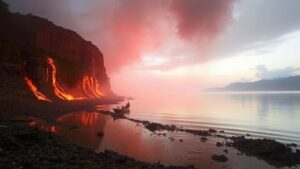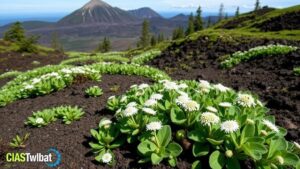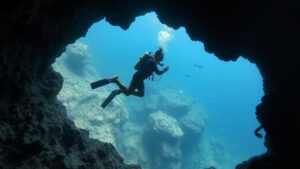Exploring the “Moonlit Canyons” in Utah, where glowing minerals are said to illuminate ancient carvings.
Exploring the Moonlit Canyons in Utah
Nestled in the remote wilderness of Utah, the Moonlit Canyons are a captivating natural wonder where luminescent minerals illuminate ancient carvings, telling stories of the past. This unique phenomenon attracts tourists, historians, and geology enthusiasts alike, promising an experience steeped in beauty and history.
The Geology Behind the Glow
The enchanting glow of the Moonlit Canyons is primarily due to the presence of rare phosphorescent minerals like calcite and fluorite, which fluoresce under certain conditions. When exposed to the moon’s light or UV rays, these minerals absorb energy and emit a captivating glow. This geological process can be likened to a glow-in-the-dark sticker that needs to be charged before it emits light.
According to a study published in the Journal of Geophysical Research, areas like Canyonlands National Park and the Grand Staircase-Escalante National Monument contain some of the highest concentrations of these minerals. This phenomenon is notably pronounced in the Silver and Blue Canyons, where specific lighting conditions create an ethereal landscape.
Ancient Carvings and Cultural Significance
The canyons are also home to a multitude of petroglyphs etched into the rock faces by Native American tribes dating back thousands of years. These carvings, which include depictions of animals, humans, and spiritual symbols, are vital cultural artifacts. Ute and Paiute tribes are known to have inhabited these lands, and their stories are captured through these ancient images.
Many of the carvings are believed to have spiritual significance, serving as a form of communication with the spirit world. For example, a prominent petroglyph in the region, referred to as the Spiritual Dance, depicts a group of figures engaging in what seems to be a ceremonial dance, conveying their connection to nature and the cosmos.
Visiting the Moonlit Canyons
For those seeking to explore the Moonlit Canyons, planning your visit during a full moon can enhance your experience. The silvery light enhances the glowing minerals, making the ancient carvings even more visible. Here are some practical tips for your visit:
- Visit during a full moon for the best illumination.
- Ensure you have proper hiking gear, as trails may be rugged.
- Bring a flashlight with a red light mode, which preserves your night vision.
The ideal time to visit is between May and September when the weather is milder, and the nights are clear. Specific locations within the canyons, like the North Fork of the Blacksmith Fork Canyon, provide access to both the glowing cliffs and rich cultural history.
Real-World Applications
The allure of the Moonlit Canyons has spurred interest in the intersection of geology and archaeology. Geologists and archaeologists are collaborating to protect and preserve these sites. Understanding the minerals and their properties not only sheds light on the geological history but also informs us about the environmental conditions during the time the carvings were made.
Plus, educational programs emphasizing the significance of natural resources and cultural heritage are gaining traction. Visitors can participate in workshops that focus on conservation efforts and the importance of protecting these irreplaceable sites.
Takeaway
The Moonlit Canyons of Utah offer a profound glimpse into both natural beauty and ancient cultures. The combination of glowing minerals and historical carvings provides a unique lens through which to explore humanitys relationship with the Earth.
Whether you are a seasoned hiker or a curious traveler, the Moonlit Canyons promise an unforgettable experience. Remember to prioritize environmental stewardship during your visit, ensuring that future generations can also appreciate these stunning landscapes.



